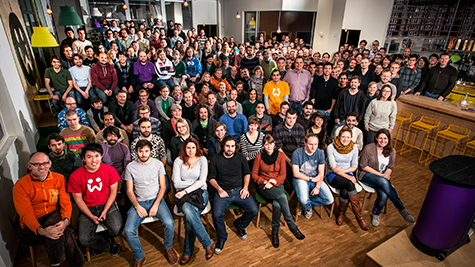“Churn prediction works for casual games, or at least for engaged segments within your player base,” Julian Runge explained during his session at Casual Connect Eastern Europe 2014.
“Increasing fun through data is an exhilaratingly cool task and something that nobody relates to data. But the games industry makes it possible!” says Julian Runge, who leads Wooga’s analytics team.
In 2012, Julian began working for Wooga as an analyst on Monster World, Wooga’s largest simulation game on Facebook at the time. His background in statistics and economic thinking, as well as the experience he received through internships and starting a small company while still at school, have been enormously helpful in his work. Now he is responsible for advanced analytics across games and for marketing. He also coordinates the work of a team of four analysts “to set the right impulses and derive impact from data on design and bottom-line.”
Passion Produces Results
Julian’s inspiration for joining the games industry was, quite simply, his passion for gaming. On a day-to-day basis, his greatest motivation is the opportunity to work with equally passionate people and assist them in developing outstanding products. He had no desire to work for a company that did not have its own creative process. And, he maintains, “What is more creative and fun than game development?”
Along with passion, he is tremendously energized by working with data and generating insight and impact from them. Even in his free time, Julian enjoys playing with data. But in contrast to the intellectual and virtual aspects of his work life, one of his favorite free-time activities is using his hands to build things.
It’s Unpredictable
In the future of the games industry, Julian sees predictive analytics becoming increasingly important, with huge implications for gameplay and marketing. He believes customized user experience will be the key success factor for gameplay. Customizing the gameplay will require adequately targeted offers, adaptive gameplay, and strategic cross-linking to other games.
Although he is personally excited about analytics and the potentially huge impact of big data on the games industry, he emphasizes that introspective game design is the key factor in success, saying, “Analytics matter, but mainly after great game design has happened.”
What he finds most appealing about the industry: its inherent unpredictability. So the future can be expected to bring surprises, possibly in game mechanics and the use of new devices. But he would love to see more augmented reality, like, for example, Google’s Ingress. He also believes there is potential in using digital technology to advance direct interaction with the physical environment for gaming.
Gaming Convenience
When Julian is gaming, he prefers the convenience of mobile and considers Android as the platform of the future, especially when he factors in the Asia market. And he plays everywhere. One of the more unusual places was a speedboat in Thailand. He was trying out a Wooga release candidate on his waterproof Xperia Z1, but unfortunately, he relates, “The processor got so hot you could have fried an egg on it.”
He concentrates on playing one or two games, usually an arcade game and another engaging game, and he plays them very intensely. Until recently, he had been focusing on Clash of Clans, but he has now deleted that app. Upgrading in the game had become ridiculously expensive, as he was to the point where it took six million elixir for level six archers and dragons. Currently, he is intensely playing a new, unreleased game from Wooga, claiming “It’s gonna be big!” At Casual Connect Eastern Europe, Julian advised everyone to “Watch for Wooga’s 2015 launches!” as well as the job opportunity of quantitative analyst for his team.









